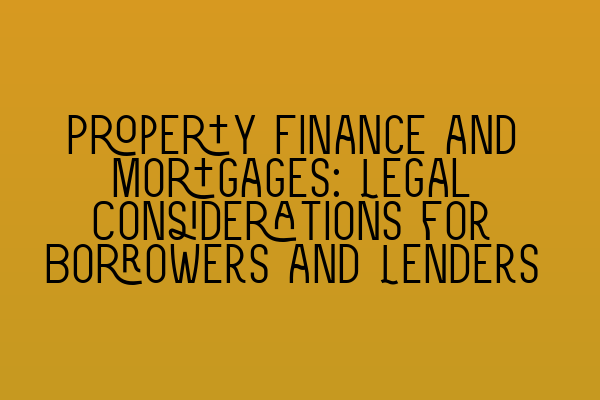Property Finance and Mortgages: Legal Considerations for Borrowers and Lenders
When it comes to property transactions, one of the key aspects that both borrowers and lenders need to consider is property finance and mortgages. Whether you are a borrower looking to secure financing for a property purchase or a lender looking to protect your investment, understanding the legal considerations surrounding property finance and mortgages is essential. In this article, we will explore some important legal aspects that both borrowers and lenders should keep in mind.
1. Types of Mortgages:
There are various types of mortgages available, each with its own legal implications. From fixed-rate mortgages to adjustable-rate mortgages and interest-only mortgages, borrowers should carefully consider their options and seek legal advice to understand the terms and conditions attached to each type. Lenders, on the other hand, should ensure that the mortgage agreement adequately protects their interests and complies with regulatory requirements.
2. Mortgage Agreement:
The mortgage agreement is a legally binding document that outlines the terms and conditions of the mortgage. It is important for both borrowers and lenders to review this document carefully before signing. Borrowers should pay attention to provisions related to interest rates, repayment terms, and any penalties or fees associated with defaulting on the loan. Lenders, on the other hand, should ensure that the agreement includes provisions for the enforcement of security and remedies in case of default.
3. Security:
In property finance, the property itself often serves as security for the loan. This means that if the borrower defaults on their mortgage payments, the lender has the right to take possession of the property. Understanding the legal implications of this security arrangement is crucial for both borrowers and lenders. Borrowers should ensure they understand the potential consequences of defaulting on their mortgage, while lenders should ensure that the security arrangements comply with legal requirements and are properly documented.
4. Due Diligence:
Both borrowers and lenders should undertake thorough due diligence before entering into a property finance transaction. Borrowers should examine the property’s title deeds, conduct surveys to identify any potential issues, and review any existing charges or restrictions on the property. Lenders should also conduct their own due diligence, including assessing the borrower’s creditworthiness, conducting property valuations, and verifying the borrower’s legal capacity to enter into the mortgage agreement.
5. Regulatory Compliance:
Property finance transactions are subject to various regulations and legal requirements. Lenders should ensure that they comply with all relevant laws and regulations, including those related to responsible lending, consumer protection, and anti-money laundering. Borrowers should also be aware of their rights and responsibilities under these regulations and seek legal advice to ensure compliance.
6. Independent Legal Advice:
Seeking independent legal advice is crucial for both borrowers and lenders involved in property finance transactions. A solicitor specializing in property law can provide invaluable guidance and ensure that your rights and interests are protected. They can review and negotiate the terms of the mortgage agreement, conduct the necessary due diligence, and ensure compliance with legal requirements.
In conclusion, property finance and mortgages involve complex legal considerations for both borrowers and lenders. Understanding the various types of mortgages, reviewing mortgage agreements, considering security arrangements, conducting due diligence, complying with regulations, and seeking independent legal advice are all important steps to protect your interests in property finance transactions.
For more information on property law and preparing for the SQE exams, check out our related articles:
– SQE 1 Practice Exam Questions: [Link Here]
– SQE 1 Practice Mocks FLK1 FLK2: [Link Here]
– SQE 2 Preparation Courses: [Link Here]
– SQE 1 Preparation Courses: [Link Here]
– SRA SQE Exam Dates: [Link Here]
At SQE Property Law & Land Law, we offer comprehensive legal services and specialized courses to help you navigate the complexities of property finance and mortgages. Contact us today to learn more about how we can assist you.
